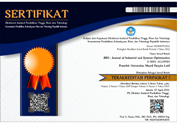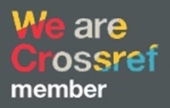ANALISIS KEPUASAN PENGGUNA TERHADAP KUALITAS WEBSITE TELKOMSEL.COM MENGGUNAKAN METODE END-USER COMPUTING SATISFACTION (EUCS)
DOI:
https://doi.org/10.51804/jiso.v7i2.76-83Keywords:
EUCS, User Satisfaction, Website, Customer Service Call Center, WifiAbstract
ABSTRAK
Telkomsel.com merupakan website resmi PT Telekomunikasi Selular (Telkomsel) yaitu perusahaan telekomunikasi penyedia jaringan selular maupun internet rumah. Website ini menyediakan informasi produk, program dan promosi, hingga event yang diselenggarakan oleh Telkomsel. Secara umum Telkomsel.com digunakan oleh pengguna website yang merupakan pelanggan dan bukan pelanggan Telkomsel untuk bertransaksi ataupun sekedar mencari informasi. Sebagai situs web yang dijalankan oleh perusahaan, website Telkomsel.com sangat berkontribusi pada keseharian karyawan PT Telkomsel khususnya Customer Service Call Center Telkomsel, yang mana menggunakan website ini sebagai salah satu alternatif dalam menggali informasi yang dibutuhkan oleh pelanggan Telkomsel. Setelah dilakukan wawancara dengan beberapa Customer Service Call Center Telkomsel, beberapa permasalahan ditemukan saat mengakses website ini seperti informasi yang tersedia kurang lengkap, tampilan website kurang menarik, dan beberapa hasil pencarian terlalu luas dan tidak mendetail. Oleh karena itu, penelitian ini bertujuan untuk menganalisis dan mengidentifikasi faktor-faktor yang mempengaruhi kepuasan pengguna terhadap suatu website dengan metode End-User Computing Satisfaction (EUCS) yang menjabarkan aspek-aspek penentu kepuasan pelanggan seperti aspek content, accuracy, format, ease of use, dan timeliness. Hasil dari penelitian ini menunjukan bahwa tingkat kepuasan sangat tinggi dari nilai yang didapat yaitu variabel format dengan nilai 90%, lalu diikuti oleh variabel lainnya yaitu content dengan nilai 89%, accuracy dengan nilai 88%, ease of use dengan nilai 88%, dan timeliness dengan nilai 86%.
ABSTRACT
Telkomsel.com is official website from PT Telekomunikasi Selular (Telkomsel), a company in the telecommunications sector. This website provides various information such as products, programs, and activities organized by Telkomsel. In general, Telkomsel.com is used by website users such as customers and non-customers to conduct transactions or simply looking for information. As a website run by the company, Telkomsel.com website contributes to the daily lives of PT Telkomsel employees, especially the Telkomsel Customer Service in Call Center, who use this website as an alternative to dig up information needed by Telkomsel customers. After conducting interviews with several Telkomsel Customer Service in Call Center, several problems were found when accessing this website, such as the information provided was incomplete, the appearance of the website was less attractive, and some search results were not detailed. Therefore, this research aims to analyze and identify factors that influence user satisfaction using End-User Computing Satisfaction (EUCS) method which describes determining aspects of customer satisfaction such as content, accuracy, format, ease of use, and timeliness. The results of this research show that the highest level of satisfaction was obtained from the format variable with a value of 90%, followed by other variables such as content with a value of 89%, accuracy with a value of 88%, ease of use with a value of 88%, and timeliness with a value of 86%.
References
Ar-Rasyid, Teuku Yusuf Ryan, et al. “Evaluasi Kepuasan Pengguna Pada Website Beasiswa Universitas Brawijaya Menggunakan Metode End-User Computing Satisfaction (EUCS).” Jurnal Pengembangan Teknologi Informasi dan Ilmu Komputer, vol. 5 No. 6, 2021, pp. 2308-2317
Azwar, Muhammad, et al. “Evaluating The Library Website Of The Indonesian Ministr ebsite Of The Indonesian Ministry Of Education And Culture Through The End-User Computing Satisfaction (EUCS) Model.” Library Philosophy and Practice, 2020, pp. 1-15
Damayanti, Asti Shofi, et al. “Evaluasi Kepuasan Pengguna Aplikasi Tapp Market Menggunakan Metode EUCS (End User Computing Satisfaction).” Jurnal Pengembangan Teknologi Informasi dan Ilmu Komputer, vol. 2 No.11, 2018, pp. 4833-4839
Doll, William J., and Gholamreza Torkzadeh. “The Measurement of End-User Computing Satisfaction.” MIS Quarterly, vol. 12 No.2, 1988, pp. 259-274
Faradilla, Adelia, et al. “Evaluasi Kepuasan Pengguna Pada Website CDC Unsri Menggunakan Metode End User Computing Satisfaction (EUCS).” KLIK: Kajian Ilmiah Informatika dan Komputer, vol. 4 No. 3, 2023
Putra, Hermawan Kurniansyah, and Rezania Agramanisti Azdy2*. “Analysis of the Level of Satisfaction of Darwinbox Application Users at PT Nippon Indosari Corpindo Tbk Using the End User Computing Satisfaction (EUCS) Method.” International Journal of Multidisciplinary Sciences and Arts, vol. 2 No. 1, 2023, pp. 13-19.
Rahmi, Alfie Nur, et al. “Evaluasi Kepuasan Pengguna Aplikasi Amikom One Menggunakan Metode EUCS.” INFOS Journal - Information System Journal, vol. 2 No.1, 2019, pp. 67-73
Sanaky, Musrifah Mardiani, et al. “Analisis Faktor-Faktor Penyebab Keterlambatan Pada Proyek Pembangunan Gedunng Asrama MAN 1 Tulehu Maluku Tengah.” Jurnal Simetrik, vol. 11 No. 1, 2021, p. 433
Downloads
Published
Issue
Section
License
Copyright (c) 2024 JISO : Journal of Industrial and Systems Optimization

This work is licensed under a Creative Commons Attribution-ShareAlike 4.0 International License.
With the receipt of the article by JISO Editorial Board and the decision to be published, the copyright regarding the article will be transferred to JISO. The copyright transfer form can be downloaded here.
JISO has the right to multiply and distribute the article and every author is not allowed to publish the same article that was published in this journal.
JISO is licensed under a Creative Commons Attribution-ShareAlike 4.0 International License.
Under the following terms:
Attribution — You must give appropriate credit, provide a link to the license, and indicate if changes were made. You may do so in any reasonable manner, but not in any way that suggests the licensor endorses you or your use.
ShareAlike — If you remix, transform, or build upon the material, you must distribute your contributions under the same license as the original.














